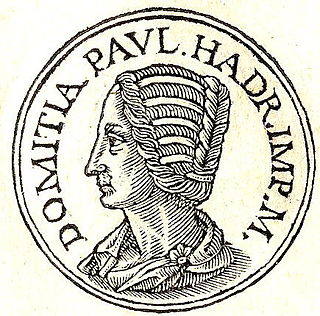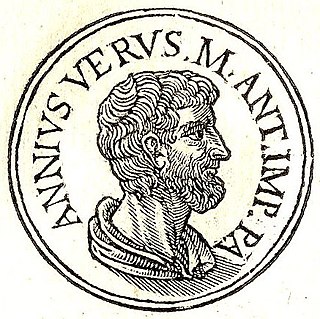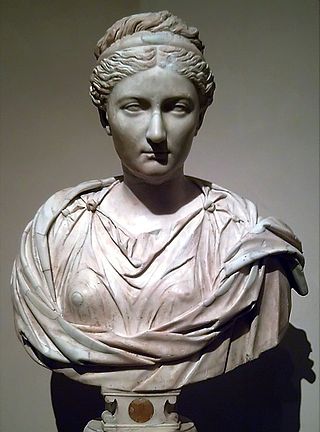Related Research Articles

Annia Aurelia Galeria Lucilla or Lucilla was the second daughter of Roman Emperor Marcus Aurelius and Roman Empress Faustina the Younger. She was the wife of her father's co-ruler and adoptive brother Lucius Verus and an elder sister to later Emperor Commodus. Commodus ordered Lucilla's execution after a failed assassination and coup attempt when she was about 33 years old.

The gens Aurelia was a plebeian family at ancient Rome, which flourished from the third century BC to the latest period of the Empire. The first of the Aurelian gens to obtain the consulship was Gaius Aurelius Cotta in 252 BC. From then to the end of the Republic, the Aurelii supplied many distinguished statesmen, before entering a period of relative obscurity under the early emperors. In the latter part of the first century, a family of the Aurelii rose to prominence, obtaining patrician status, and eventually the throne itself. A series of emperors belonged to this family, through birth or adoption, including Marcus Aurelius and the members of the Severan dynasty.
Appius Junius Silanus, whom Cassius Dio calls Gaius Appius Silanus, was consul in AD 28, with Publius Silius Nerva as his colleague. He was accused of majestas, or treason, in AD 32 along with a number of senators, but he and Gaius Calvisius Sabinus were saved by one of the informers, Celsus, a tribune of a city cohort.

Calvisia Domitia Lucilla, was a noble Roman woman who lived in the 2nd century. She is best known as the mother of the Roman Emperor Marcus Aurelius.

Paulina or Paullina is a common female given name Latin. In Greek it means: Paulina was a name shared by three relatives of the Roman Emperor Hadrian: his mother, his elder sister and his niece.

Annia Cornificia Faustina Minor was a daughter of the Roman emperor Marcus Aurelius and his wife, Faustina the Younger. She was sister to Lucilla and Commodus. Her maternal grandparents were Antoninus Pius and Faustina the Elder, and her paternal grandparents were Domitia Lucilla and praetor Marcus Annius Verus. She was named in honor of her late paternal aunt Annia Cornificia Faustina.
The gens Aelia, occasionally written Ailia, was a plebeian family in Rome, which flourished from the fifth century BC until at least the third century AD, a period of nearly eight hundred years. The archaic spelling Ailia is found on coins, but must not be confused with Allia, which is a distinct gens. The first member of the family to obtain the consulship was Publius Aelius Paetus in 337 BC.
The gens Calvisia was an ancient Roman family, which first rose to prominence during the final decades of the Republic, and became influential in imperial times. The first of the gens to obtain the consulship was Gaius Calvisius Sabinus in 39 BC.

Marcus Annius Verus was a distinguished Roman politician who lived in the 2nd century, served as a praetor and was the father of the Emperor Marcus Aurelius.
Publius Aelius Hadrianus Marullinus, also known as Aelius Hadrianus Marullinus or Aelius Marullinus, was a Roman Senator of Praetorian rank from Hispania who lived in the Roman Empire during the 1st century.

Vibia Aurelia Sabina was the youngest daughter and child born to Roman Emperor Marcus Aurelius and Roman Empress Faustina the Younger. She was a sister to Roman Empress Lucilla and Roman Emperor Commodus. Her maternal grandparents were Roman Emperor Antoninus Pius and Roman Empress Faustina the Elder and her paternal grandparents were Domitia Lucilla and praetor Marcus Annius Verus.

The gens Horatia was a patrician family at ancient Rome. In legend, the gens dates back to the time of Tullus Hostilius, the third King of Rome. One of its members, Marcus Horatius Pulvillus, was consul suffectus in 509 BC, the first year of the Republic, and again in 507. The most famous of the Horatii was his nephew, Publius Horatius Cocles, who held the Sublician bridge against the army of Lars Porsena circa 508 BC.
Aulus Cornelius Palma Frontonianus was a soldier and Roman statesman who was twice consul: first as consul ordinarius in AD 99, with Quintus Sosius Senecio as his colleague; and again in 109, with Publius Calvisius Tullus Ruso as his colleague.
The gens Domitia was a plebeian family at ancient Rome. The first of the gens to achieve prominence was Gnaeus Domitius Calvinus, consul in 332 BC. His son, Gnaeus Domitius Calvinus Maximus, was consul in 283, and the first plebeian censor. The family produced several distinguished generals, and towards the end of the Republic, the Domitii were looked upon as one of the most illustrious gentes.
Lucius Catilius Severus Julianus Claudius Reginus was a Roman senator and general active during the reigns of Trajan and Hadrian. He was appointed consul twice: the first time in 110 CE with Gaius Erucianus Silo as his colleague; the second in the year 120 with the future emperor Antoninus Pius as his colleague. Catilius was also the step-great-grandfather of the emperor Marcus Aurelius.
Gnaeus Domitius Lucanus was a Roman senator and military commander active in the first century AD. His full name is Gnaeus Domitius Afer Titius Marcellus Curvius Lucanus. He was suffect consul sometime between 76 and 78.
Gnaeus Domitius Tullus was a Roman senator and military commander active in the first century AD. His full name is Gnaeus Domitius Curvius Tullus. He was twice suffect consul: the first time between 76 and 79; the second time for the nundinium of 13 to 31 January 98 as the colleague of Trajan.
Publius Calvisius Ruso was a Roman senator, who was active during the Flavian dynasty. He was suffect consul in the nundinium of March-June 79 as the colleague of Lucius Junius Caesennius Paetus. A shadowy and enigmatic figure, many of the facts of Ruso's life have been debated by the experts.
The gens Curvia was a minor Roman gens best known for being among the ancestors of emperor Marcus Aurelius.